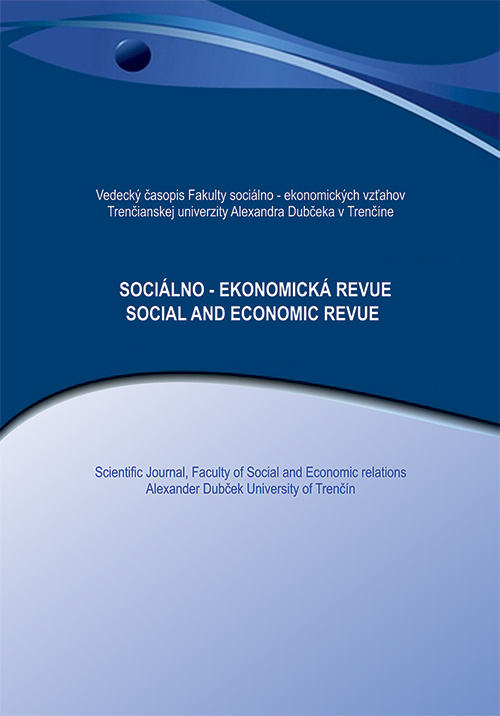GLOBAL LOGISTIC CLUSTER: THE FUTURE SUPPLY CHAIN WITHOUT HUMAN INTERFERENCE
Globalization has dramatically changed the competitiveness environment. In the past, the competitiveness environment used to be more stable and did not require the supply chain to be resilient. The disturbances have caused the supply chain to increase costs and lead-time. Moreover, the consumer trend for high quality products, with minimal costs and just on times limits the competiveness of the supply chain. The majority of research recommends to implemented logistic clusters to minimize these negative effects and maintain competiveness; however the research does not consider the management part of the logistic clusters. The authors indicate that a concept of cyber-physical systems can be used to limit the trade-offs in the logistic cluster management. The main finding is that these technologies enables the supply chain to gather information, process it and utilize the information by using innovative technologies such as autonomous vehicles. The developed methodology based on these trends can be used to implement a global logistic cluster without human interference. The created methodology could minimize the trade-offs in the supply chain, which are necessary with the current understandement of supply chain management.
Release: 2017/1 Pages: 12-18 JEL classification: L91, P25, O32
DOI:
Keywords: Supply chain, logistic cluster, industry 4.0, self-driven vehicles, innovation
Section: INTERNATIONAL ECONOMICS AND POLITICS
Contacts:
Valentas Gružauskas
Kaunas University of Technology,
School of Economics and Management,
Department of management;
e-mail: valentas.gruzauskas@ktu.lt
Rusnė Jegelavičiūtė
Real estate appraiser-assistant,
Lituka ir ko, Ltd;
e-mail: rusnejegelaviciute@gmail.com
Mykolas Navickas
Vilnius University,
Department of finance;
e-mail: mykolas.navickas@gmail.com
Literature:
Bloomberg, 2016. Uber’s First Self-Driving Fleet Arrives in Pittsburgh,
Bloomberg, 2016. World’s First Self-Driving Taxis Debut in Singapore.
Bureau of Labour, 2015. Employment projections 2014-2024.
Buxmann, P. et al., 2008. Economic evaluation of cooperation scenarios in supply chains. Journal of Enterprise Information Management, 21(3), pp.247–262.
Christopher, M. & Holweg, M., 2011. “Supply Chain 2.0”: managing supply chains in the era of turbulence. International Journal of Physical Distribution & Logistics Management, 41(1), pp.63–82.
European commission, 2013. Cyber-Physical Systems : Uplifting Europe’s Innovation Capacity. Report from the Workshop on Cyber-Physical Systems.
Dani, S., 2015. Food Supply Chain Management and Logistics: From Farm to Fork policy, London.
Delgado, M., Porter, M.E. & Stern, S., 2014. Clusters , convergence , and economic performance, Reaserch policy, vol. 43, pp.1785–1799.
DHL Trend Research, 2014. Self-Driving Vehicles in Logistics, Troisdorf.
Food and Agriculture Organization, 2015. How to Feed the World in 2050.
Frazzon, E.M. et al., 2013. Towards socio-cyber-physical systems in production networks. Procedia CIRP, 7, pp.49–54.
Herterich, M.M., Uebernickel, F. & Brenner, W., 2015. The Impact of Cyber-physical Systems on Industrial Services in Manufacturing. Procedia CIRP, 30, pp.323–328.
IBM, 2012. A Computer Called Watson.
Lau, H.C., 2014. Collaborative Urban Logistics – Challenges , Current Practices and Future Research Last Mile Urban Logistics. Logistics and Supply Chain Symposium Urban Logistics: E-Commerce & Sustainability.
Lee, H., Kim, M.S. & Kim, K.K., 2014. Interorganizational information systems visibility and supply chain performance. International Journal of Information Management, 34(2), pp.285–295.
United Nations, 2015. World Population Prospects.
Nie, P. & Sun, P., 2015. Search costs generating industrial clusters. 42, pp.268–273.
Oborski, P., 2016. Integrated Monitoring System of Production Processes. Management and Production Engineering Review, 7(4), pp.86–96.
Parfitt, J., Barthel, M. & Macnaughton, S., 2010. Food waste within food supply chains: quantification and potential for change to 2050. Philosophical transactions of the Royal Society of London. Series B, Biological sciences, 365(1554), pp.3065–81.
pwc, 2016. Industry 4 . 0 : Building the digital enterprise.
Tachizawa, E.M., Alvarez-Gil, M.J. & Montes-Sancho, M.J., 2015. How “smart cities” will change supply chain management. Supply Chain Management: An International Journal, 20(3), pp.237–248.
The Guardian, 2016. Elon Musk wants to cover the world with internet from space.
Trappey, A.J.C. et al., 2016. A Review of Technology Standards and Patent Portfolios for Enabling Cyber-Physical Systems (CPS) in Advanced Manufacturing. IEEE Access.
World Resources Institute, 2013. Creating a Sustainable Food Future: A menu of solutions to sustainably feed more than 9 billion people by 2050. World Resources Report, p.130.


